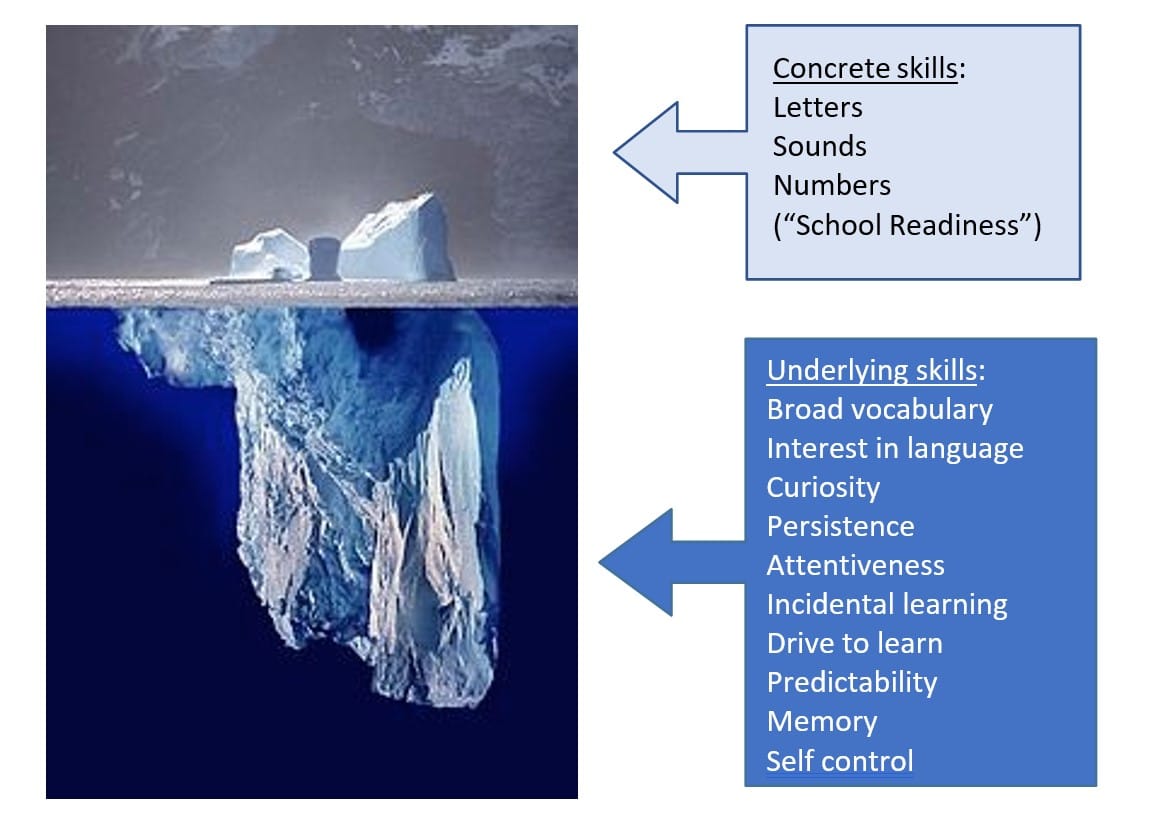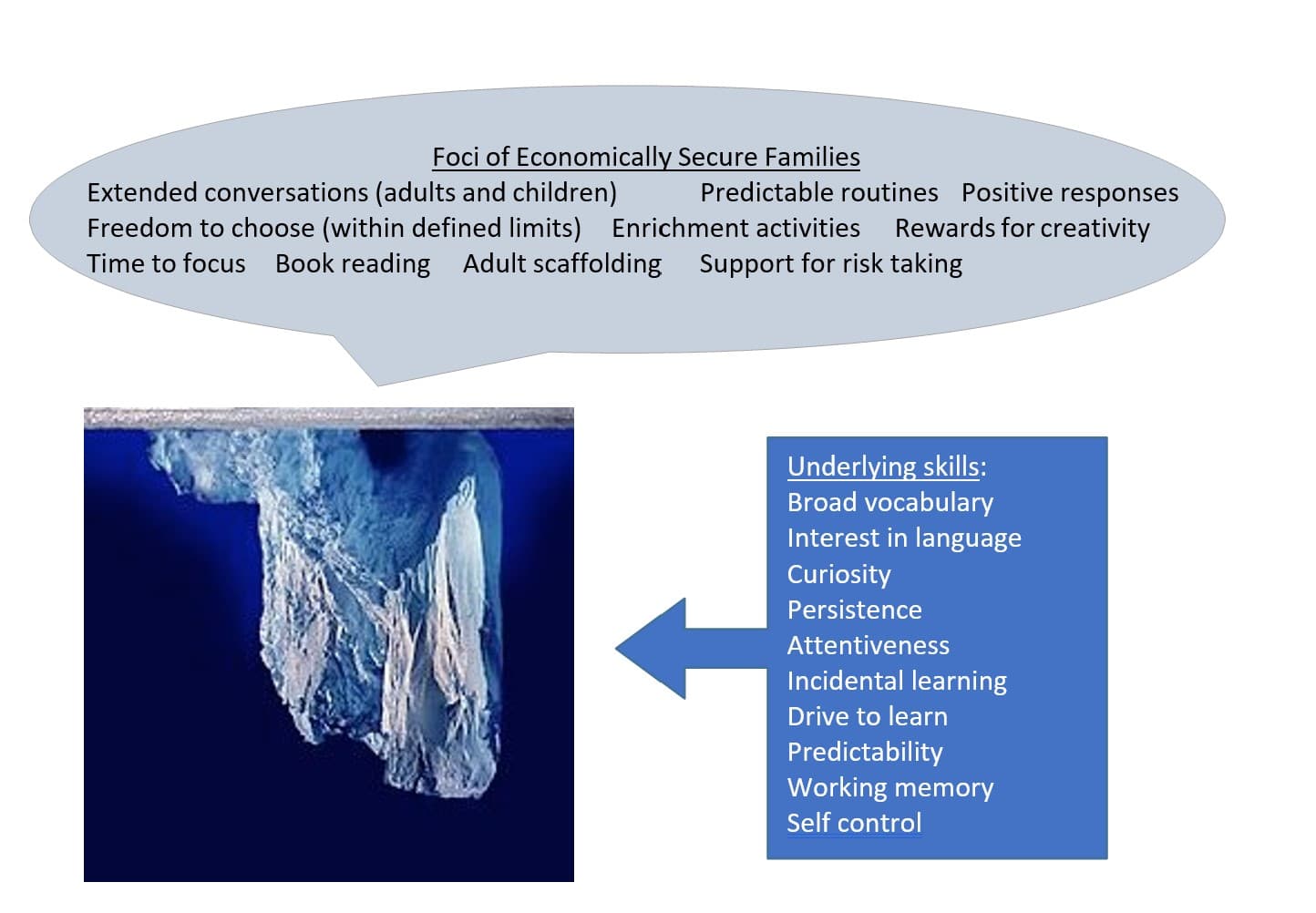by Dale C. Farran, Phd, Research Professor, Vanderbilt University.
In the U.S. concern about the achievement gap between children from low- and higher- income families increased greatly over the last 20 years, resulting in a dramatic downward push for academic achievement in the early years.
Years ago, few teachers believed that children should be taught to read in kindergarten; a more recent survey shows that 80% of kindergarten teachers now think children should know how to read before leaving the grade.
As recently as 1993 the great majority of kindergarten teachers did not believe an academic focus in preschool was important for children’s school success.
However, concern for the “fade out” of pre-kindergarten effects has led several researchers and policy makers to argue for a stronger academic focus in those classrooms, including the use of an intentional scripted, academically focused curriculum.
Not only do effects from pre-k classrooms fade, but also results from one study of the longitudinal effects of pre-k attendance conducted by my colleagues and me demonstrated that in the long run the effects turned negative.
A greater focus on academics for three- and four- year-olds is not the solution.
As an author of the recent paper on long term effects and as a primary investigator on the only randomized control trial of a statewide pre-k program with longitudinal data, and, finally, as a developmental psychologist whose career focused on young children’s development, I have thought extensively about what the causes of these unexpected effects might be.
I am proposing an “iceberg model of early developmental competencies.”

The tip of the iceberg, the section floating above the surface, is composed of things that are easily measured.
These types of skills have recently been characterized as “constrained” skills meaning they are finite and definable.
All standard school readiness assessments focus on these types of skills.
But they do so because assessors believe that the skills represent deeper competencies.
They measure these skills somewhat like taking a finger-prick for evidence of the information the assessments provide into other more important characteristics of children.

Both the focus of current pre-k programs and the pedagogical strategies employed focus almost exclusively on the tip of the iceberg skills.
Many who have been in early childhood for a long time testify to the changes in classrooms.
I believe these changes are accelerated by the process of subsuming preschool into the K-12 system.
In many states the department of education administers the pre-kindergarten program, and the program behaves like an additional grade level below kindergarten – the classrooms are open for the school day (5-6 hours a day) and the school calendar (9 months a year).
The classrooms are most often in elementary schools, where the push down from the K- 12 system is almost impossible to avoid.
Many of the elementary schools are older and unsuitable for younger children – no bathroom connected to the classroom, the requirement to have meals in the large cafeteria, and no appropriate playground.
These physical features mean that children spend a lot of time transitioning from the classroom, necessitating a high level of teacher control as children walk through the halls and endure long wait times.
Descriptions from a number of large studies of the instructional strategies used in current pre-k classrooms show them to be dominated by whole group instruction focused on basic skills (the tip of the iceberg).
Teachers talk at children a majority of the time, seldom listening to children, and multi-turn conversations are a rare occurrence.
Learning opportunities that involve other than right-answer questions are almost never observed, and a high level of negative control from teachers characterizes many classrooms.
This content focus and the teaching strategies, I argue result in a detachment of the tip of the iceberg from the deeper skills under the surface.
Thus, children can score well on school readiness skills at the end of pre-k – especially on those related to literacy – but not maintain any advantage by the end of kindergarten when all children attain these skills with or without pre-k experience.
The tip of the iceberg skills no longer symbolizes those under the surface.
They are no longer the visible and measurable aspects of more important competencies.
Only when the deeper skills are enhanced should we expect continued progress based on early experiences.
A very different set of experiences likely facilitates the development of those deeper skills.
We have known for many years that the developmental period between four and six years is a critical one.
Neuroscience confirmed the importance of this period for the development of the pre-frontal cortex.
The pre-frontal cortex is involved in many of the skills described in the model as being below the surface.
Research does not provide good evidence for which experiences facilitate the development of important skills like curiosity, persistence, or working memory.
But research has demonstrated the importance of these kinds of skills for long term development.
For instance, some argue that early attention skills are more important than early academic skills as predictors of long-term school success including the likelihood of attending college.
In a large longitudinal study, researchers identified the importance of the development of internal self-control during the ages of four to six.
Some children with initially low self- control developed self-control during early childhood and had subsequent better outcomes via what the researchers called a “natural history change.”
Whether an intervention-induced change would yield the same positive outcomes is an open question.
So far, no early childhood curriculum has been able to bring about sustained changes in self-control or any of the below- the-surface skills listed above.
What is clear is that children from more affluent homes enter kindergarten scoring higher on school readiness skills.
Moreover, they maintain that advantage across the school years.
But they did not learn those “readiness” skills from a didactic pre-k experience.
While these children may have had magnetic alphabet letters to play with, for example, parents did not sit them down in front of the refrigerator and force them to learn the letters.
Most of those tip-of-the-iceberg skills were learned through a variety of experiences and the opportunity to learn through interactions with adults and friends.
For these children, measuring the tip does provide information about the beneath the surface competencies that are so important.
Guidance may come from comparing the developmental contexts of families who are economically secure to the pre-k classroom context.
Children of economically secure families are more likely to succeed in school, more likely to matriculate in a two or four year college and more likely to graduate when they enter.

Nothing in this model asserts that children should be raised at home, but group contexts for young children are much more difficult to do well.
This is true despite the fact that we should be able to control what happens to children in publicly or privately funded group care.
While there have been efforts to regulate group care, none are very successful in creating the kinds of experiences that might be most developmentally facilitative.
But these types of positive experiences can be found in some very particular group contexts.
Unfortunately, these contexts tend to be available to families who have resources and who choose specific kinds of experiences for their children — perhaps as an extension of the family context.
Many nursery schools, high end childcare centers and special programs like Montessori, Waldorf and outdoor or “nature” preschools, among others, provide young children positive, enhancing experiences.
The desire of economically secure families to protect their children from the recent increased academic focus in early education extends to kindergarten where higher income families are twice as likely to “redshirt” their children (holding them back a year) than lower income families.
If higher income families are concerned about the academic pressures on their young children and choosing to pay for programs that are positively affirming and very experiential in nature, why would we assume that young children from poorer families should be subjected to a completely different set of experiences?
Recently a father of a three-year-old indicated that he and his wife were considering moving the child from his childcare situation to a pre-k classroom in an elementary school in a large city.
What was wrong with his childcare situation, I asked.
Nothing, he replied; in fact it was wonderful, the child had many friends and the teachers were lovely.
“Why would you want to move him?” I asked.
“Because childcare costs us $24,000 a year and the pre-k classroom will provide free care for at least part of the day.”
Many U.S. parents find themselves on the horns of this same terrible dilemma.
The United States is the only highly developed country that does not support families and subsidize care for its young children.
The type of childcare that lower- and middle-income parents in the U.S. can afford is abysmal – poorly trained staff, high turnover rates because of low wages and poor benefits.
But the alternative to this untenable situation should not be “school” for very young children.
Governments in most highly developed countries heavily subsidize the care for young children prior to school age.
Nordic countries all provide a child supplement to parents, which most parents use to offset the modest cost of the government-subsidized group care, care that looks nothing like U.S. pre-k programs.
These programs stress different sorts of competencies in young children, capabilities like “participation” or the ability to be a functioning member of a group (not sitting “criss-cross applesauce” for 20-40 minutes during large group instruction).
The programs stress self-reliance and independence, the ability to make good decisions and to be responsible for one’s actions.
Most of these countries delay formal instruction in academic skills until children are six or seven. Their children do quite well in international comparisons in the later grades.
Concerns about the accelerating academic focus in early childcare education are being voiced by many.
I hope this “iceberg” model will provide a useful visual depiction of the danger of concentrating on basic skills instruction in pre-k.
I hope also that it will help people understand why getting early childhood right is so important and the imperative need to fix the childcare situation in the U.S. for families of poor children – in fact for all our children.
Pre-k is not the magic bullet policy makers hoped it would be. Quite the contrary. The reason it is not may lie with the unavoidable focus of the program when it becomes part of the K-12 system.
References from this article are available on request.
Guest Contributor
Dale Farran, Ph.D. is a Research Professor in Early Childhood Education: Professor Emerita, Department of Teaching and Learning. Dr. Farran has been involved in research and intervention for high-risk children and youth for all of her professional career. She has conducted research at the Frank Porter Graham Child Development Center in Chapel Hill, N.C., and the Kamehameha Schools Early Education Project in Hawaii. Dr. Farran is the editor of two books both dealing with risk and poverty, the author of more than 90 journal articles and book chapters and a regular presenter at national conferences. Her recent research emphasis is on evaluating the effectiveness of alternative preschool curricula for preparing children from low-income families to transition successfully to school and longitudinal follow up for long-term effects. Currently she is directing an evaluation of the State of Tennessee’s Prekindergarten program. Most recently she has been involved in identifying early childhood classroom practices most facilitative of children’s outcomes, including coaching tools to improve practice.
Dale

You can read more thoughts on the pushdown of academics on DEY’s blog and publications.
